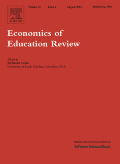
ECONOMICS OF EDUCATION REVIEW
Scope & Guideline
Unleashing the power of economics to enhance education.
Introduction
Aims and Scopes
- Policy Analysis and Evaluation:
The journal emphasizes rigorous evaluation of educational policies, including their economic implications on student outcomes, funding structures, and institutional responses. - Labor Market Outcomes:
Research often investigates the alignment of education with labor market demands, exploring how educational attainment influences employment, wages, and career trajectories. - Inequality and Equity in Education:
A significant focus is placed on understanding disparities in educational access and outcomes across different demographics, including socioeconomic status, race, and gender. - Impact of Educational Interventions:
The journal publishes studies assessing the effectiveness of various educational interventions, programs, and reforms, particularly in low and middle-income countries. - Non-Cognitive Skills and Development:
In addition to cognitive skills, the journal also explores the role of non-cognitive skills, such as social-emotional learning and resilience, in educational success. - International Education Systems Comparison:
The journal frequently features comparative studies that analyze educational systems across countries, providing insights into best practices and lessons learned.
Trending and Emerging
- Impact of COVID-19 on Education:
A significant increase in research addressing the educational disruptions caused by the COVID-19 pandemic, including studies on learning loss, remote instruction, and long-term implications for student achievement. - Social and Emotional Learning (SEL):
There is a growing emphasis on the importance of social and emotional learning in educational settings, with research exploring its relationship to academic success and overall well-being. - Equity and Inclusion in Education:
Research focusing on equity issues, including the effects of race, gender, and socioeconomic status on educational outcomes, is increasingly prevalent, reflecting broader societal conversations about justice and inclusion. - Technology and Education:
The integration of technology in educational practices, including the effectiveness of online learning and educational technologies, is a rapidly growing area of interest. - Financial Literacy and Education,:
An emerging focus on the importance of financial literacy education in schools, exploring its impact on students' future economic behaviors and decision-making.
Declining or Waning
- Traditional Measures of Academic Achievement:
Research focusing solely on standardized test scores as a measure of success has decreased, as scholars increasingly advocate for a more holistic view of educational outcomes. - Effects of School Size on Performance:
Studies examining the impact of school size on educational outcomes are becoming less common, possibly due to a growing recognition of the importance of context-specific factors over mere size. - Specific Financial Aid Models:
There is a noticeable decline in research dedicated to evaluating particular financial aid models, such as merit-based scholarships, as the discourse shifts toward broader systemic issues in educational finance. - Teacher-Student Ratios as a Primary Metric:
While still relevant, the focus on teacher-student ratios as a standalone metric for educational quality is waning in favor of more nuanced analyses of instructional quality and pedagogical effectiveness. - Direct Comparisons of Charter and Public Schools:
The prevalence of studies that directly compare charter schools to traditional public schools is decreasing, possibly reflecting a shift toward more complex analyses of school choice dynamics.
Similar Journals
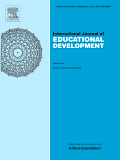
INTERNATIONAL JOURNAL OF EDUCATIONAL DEVELOPMENT
Exploring the intersection of education, society, and policy.The International Journal of Educational Development, published by Pergamon-Elsevier Science Ltd, stands as a pivotal platform in the fields of education, sociology, and political science. With an impressive impact factor and categorized in the Q1 quartile for 2023 across multiple disciplines, this journal fosters high-quality scholarly discourse aimed at addressing developmental issues within educational frameworks globally. Since its inception in 1981, the journal has become a cornerstone for researchers and practitioners to share impactful studies that contribute to the evolving landscape of educational development. Though not an open-access journal, it presents a wealth of rigorous research that engages critical issues affecting education systems, their sociopolitical contexts, and overall developmental strategies. Renowned for its comprehensive coverage and robust rankings on Scopus, it is a vital resource for anyone dedicated to advancing the field of education through empirical research and theoretical exploration.
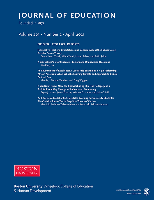
Journal of Education-US
Exploring diverse methodologies to enhance learning.Journal of Education-US, published by SAGE Publications Inc, is an esteemed academic journal dedicated to advancing the field of education through rigorous research, theoretical discourse, and diverse methodologies. With both print (ISSN: 0022-0574) and digital (E-ISSN: 2515-5741) formats available, this journal serves as a vital resource for educators, researchers, and policy-makers alike. The journal is classified in the Q2 quartile for Arts and Humanities and Q3 for Education as of 2023, reflecting its influence within the academic community. It holds a respectable rank of #908 out of 1543 in the Scopus database within the Social Sciences Education category, indicating its relevance and contribution to ongoing debates and innovations in educational practices and theories. While not currently an open-access journal, its carefully curated articles provide valuable insights and foster critical discussions that drive the education sector forward. With a publication span from 2005 and ongoing, the Journal of Education-US remains a cornerstone for impactful scholarship in education.

Revista Espanola de Educacion Comparada
Exploring the Nexus of Culture and LearningRevista Espanola de Educacion Comparada, published by UNIV NACIONAL EDUCACION DISTANCIA, is a premier academic journal dedicated to the field of education and comparative education, actively contributing to the discourse since its transition to an Open Access format in 1995. Based in Spain, this journal serves as a vital resource for researchers, educators, and policymakers, focusing on the intersection of education, culture, and philosophy. With an impressive Q3 ranking in Education and a stellar Q1 ranking in Philosophy as of 2023, the journal exemplifies rigorous scholarly excellence, reflected in its Scopus rankings, which place it in the top 85th percentile for Philosophy and the 47th percentile for Education. Spanning publication years from 2019 to 2024, it aims to foster innovative ideas and critical discussions, making it an essential read for those invested in advancing educational practices and theoretical frameworks globally.
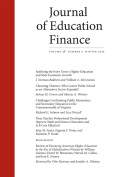
Journal of Education Finance
Charting New Paths in Education Funding ResearchThe Journal of Education Finance is a pivotal academic platform dedicated to the intersection of education funding, policy, and administration. Published by University of Illinois Press, this journal features a robust collection of peer-reviewed articles that examine financial practices within educational institutions, aiming to enhance understanding of fiscal dynamics in the sector. With its ISSN 0098-9495 and E-ISSN 1944-6470, the journal spans research from 2005 to 2023, reflecting significant themes that shape contemporary discourse in education finance. Recognized in the Q3 category for Education and Q4 for both Finance and Public Administration in the 2023 quartiles, it is positioned within the realm of social sciences and offers critical insights that appeal to researchers, policymakers, and practitioners alike. Although not an open-access journal, it ensures prolific dissemination of knowledge crucial for driving effective financial strategies in educational contexts. With its current Scopus rankings placing it in the lower percentiles of its categories—ranked #192 in Public Administration and #1318 in Education—there remains a significant opportunity for researchers to contribute to this underrepresented field. The journal’s commitment to rigorous scholarship helps to illuminate the challenges and innovations in funding education, making it an essential resource for those dedicated to improving the educational landscape.

Journal of Postsecondary Education and Disability
Promoting Best Practices for Disability Advocacy.The Journal of Postsecondary Education and Disability (ISSN: 2379-7762; E-ISSN: 2328-3343), published by the Association on Higher Education and Disability (AHEAD), stands as an essential resource for researchers, professionals, and students dedicated to the study and enhancement of postsecondary education for individuals with disabilities. This esteemed journal aims to foster a deeper understanding of accessibility issues, inclusive practices, and policy development within higher education contexts, thereby facilitating academic discourse and innovative solutions. With its commitment to advancing knowledge and promoting best practices, the journal serves as a pivotal platform for sharing empirical research, theoretical discussions, and case studies that address the multifaceted challenges faced by students with disabilities. By providing high-quality content that bridges research and practice, the Journal of Postsecondary Education and Disability plays a critical role in shaping inclusive educational environments and empowering diverse student populations.
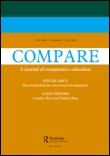
Compare-A Journal of Comparative and International Education
Fostering Dialogue on Global Educational PracticesCompare: A Journal of Comparative and International Education, published by Routledge Journals, Taylor & Francis Ltd, stands as a leading platform in the field of education, specifically within comparative and international perspectives. With a rich history dating back to 1975, this journal has become essential reading for researchers and professionals alike, contributing significantly to the discourse on educational systems, policies, and practices across different contexts. The journal boasts an impressive Q1 classification in Education for 2023, ranking 234th out of 1543 journals in the Social Sciences Education category, placing it in the top 16% of its field. While the journal does not currently offer open access, its comprehensive analyses and insightful research articles appear across various annual issues, making it a vital resource for those striving to understand and improve educational outcomes globally. For scholars and practitioners looking to engage with cutting-edge research, Compare provides an invaluable lens through which to examine and reflect on the complexities of education in an increasingly interconnected world.

Research in Comparative and International Education
Navigating the Intersections of Culture and EducationResearch in Comparative and International Education, published by SAGE Publications Ltd, is a prominent journal dedicated to the interdisciplinary study of educational systems from a global perspective. With its ISSN 1745-4999, this esteemed publication is based in the United Kingdom and provides valuable insights into the complexities of education across different cultural and socioeconomic contexts. Since its establishment, the journal has garnered respect within the academic community, reflected in its 2023 ranking in Q2 of the Education category on Scopus, where it ranks #505 out of 1543 journals, placing it in the 67th percentile. Researchers, professionals, and students alike will find a wealth of peer-reviewed articles that contribute to ongoing discussions in comparative education, aiming to enhance understanding and drive improvements within educational policy and practice worldwide. While the journal does not currently offer open access, it remains a vital resource for anyone engaged in the study or application of international educational research.

International Journal of Educational Sciences
Fostering Global Dialogue on Educational SciencesThe International Journal of Educational Sciences, published by KAMLA-RAJ ENTERPRISES, stands as a significant platform for advancing research and discourse in the field of education. With its ISSN 0975-1122 and an established reputation, this journal aims to bridge the gap between theoretical and practical applications in educational sciences. Though currently lacking an impact factor, it is dedicated to publishing high-quality peer-reviewed articles that reflect innovative educational practices, policy evaluations, and pedagogical advancements. The journal is designed to be accessible to a global audience of researchers, educators, and policymakers seeking insightful analysis and fresh perspectives on contemporary educational challenges. Situated in Gurugram, Haryana, India, the International Journal of Educational Sciences encourages submissions that contribute to the ongoing dialogue about education's role in shaping societies, making it a vital resource for those engaged in this dynamic field.
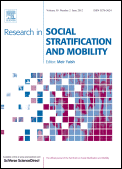
Research in Social Stratification and Mobility
Transforming perspectives on mobility and social justice.Research in Social Stratification and Mobility, published by Elsevier, is a premier interdisciplinary journal dedicated to advancing the understanding of social class dynamics, inequality, and mobility within contemporary societies. As a highly regarded publication in the field, this journal holds an impressive Q1 ranking in both Social Sciences (miscellaneous) and Sociology and Political Science, reflecting its significant impact and relevance. With a Scopus rank of 25 out of 604 in Social Sciences and 63 out of 1466 in Sociology and Political Science, it stands at the forefront of scholarly discourse with a percentile placement of 95th in both categories. Researchers, professionals, and students alike will find a wealth of rigorous empirical studies, theoretical discussions, and policy analyses that illuminate the complexities of social stratification and its implications on mobility trends. Although this journal is not open access, it remains a vital resource for those invested in sociological research and policy-making, offering valuable insights that contribute to the ongoing dialogue surrounding inequality and social opportunity.

Large-Scale Assessments in Education
Shaping the Future of Education Through Rigorous AnalysisLarge-Scale Assessments in Education is an influential journal published by SPRINGER, dedicated to the examination and analysis of large-scale educational assessments. Since its inception in 2013, this open-access journal has become a vital resource for researchers, educators, and policymakers interested in understanding and improving educational systems through rigorous assessment methodologies. With an impressive 2023 Scopus rank of 350 out of 1543 in the field of Education, placing it in the top 77th percentile, and recognized as a Q1 category journal, it is at the forefront of scholarly dialogue surrounding education assessment practices. The journal's commitment to disseminating high-quality research and innovative approaches to large-scale assessments emphasizes its importance as a scholarly platform within the field of Educational Research. The journal's articles offer valuable insights, facilitating the exchange of ideas and best practices among researchers and professionals, ultimately contributing to enhanced educational outcomes worldwide.